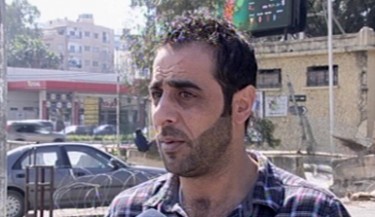Um vídeo [en] filmado com um telefone celular mostrando uma empregada doméstica etíope a ser agredida e arrastada à força para um carro sob o olhar de curiosos fora do consulado da Etiópia em Beirute, no Líbano, provocou a cólera dos internautas etíopes.
O vídeo mostra a mulher deitada de costas na lateral da rua, cercada pelos agressores [en] que falavam em árabe. Um deles é visto arrastando-a pelos braços e pelos cabelos. Ela resiste e diz em amárico: “Eu não vou! Eu não vou!”
Imediatamente, os internautas etíopes deixaram centenas de comentários [en] no YouTube. Muitos internautas compartilharam o polêmico vídeo em suas páginas do Facebook, a rede social mais frequentada da Etiópia, produzindo centenas de comentários. O silêncio dos espectadores libaneses do outro lado da rua e -muito mais- a incapacidade dos funcionários do consulado da Etiópia no Líbano de manter a moça longe de seus agressores em muito irritou os etíopes.
http://www.youtube.com/watch?feature=player_embedded&v=aJeoGYG2Nfc
A maioria dos internautas expressou sua raiva pelos agressores referindo-se a eles como “árabes” e “muçulmanos”.
Num desses comentários no YouTube, fisu2011 [en] diz:
I want you to watch the video footage of “Barbarism in Lebanon” against defenseless Ethiopian woman. Someone has to be held accountable for this crime sooner or later. Shame on you barbaric Lebanese and Arabs. I hope once Syria is cleansed from Bashar Al Assad Lebanon might be expunged by the Israelites. Ethiopians who watched this video will never forget this brutality and will revenge soon or later.
A troca de comentários foi hostil até mesmo com a cultura árabe e os muçulmanos. Uma observação em especial diz:
This is nothing compared to what many Arabs do to most emigrant workers…I have personally seen and witnessed some gruesome accounts of abuse and even death that happened to a number of Ethiopian woman, but as an EthiopianI feel for my sisters and as a human being I just can’t help but detest the Arabs and their barbaric culture…call it being racist or ignorant but this is the fact…..they are evil…
Contudo, a conversa incluiu também opiniões mais moderadas de etíopes que insistiam que não se deve estereotipar as pessoas, além de que deve haver mais tolerância. Por exemplo, mamelo4us diz [en]:
I am not an Arab I am Ethiopian like you & I am proud to be a Muslim, if you had a brain you shouldn't give a comment like that blaming all Arabs for what happen to our sister. Cruel, insane & criminals have no faith, race or color they are all over the world & we should fight them as a person not as race, faith or as a society. I know your comment will not reflect as all Ethiopians because we Ethiopians know the difference between one person & a society. They brought the criminal to justice.

Ali Mahfouz – o homem visto no vídeo agredindo a trabalhadora doméstica etíope. Esta foto é cortesia de http://www.lbcgroup.tv/.
Mahlet Solomon, uma respeitada formadora de opinião, escreveu [en] em sua página no Facebook:
I don't want to share the video of the Ethiopian domestic worker being kidnapped in front of the Ethiopian embassy in Lebanon. I don't want to share it because I am TIRED of the trivial question – why do Ethiopians suffer in every part of the world? And because there is nothing I can do about it or I have tried to do where as father (a white American) with the aspiration of giving a better world to his son wages a war on Uganda in the name of bring Joseph Kony to justice with the determination of stopping at nothing.
Being confined by our limitation must stop, it must stop. Our expectation shouldn't also be limited, they should not. And even if they are, we should exceed them yes we should exceed our limitation. We just have to start thinking, THINK!!!”
Eu não quero compartilhar o vídeo da empregada doméstica etíope a ser sequestrada em frente à embaixada da Etiópia no Líbano. Eu não quero compartilhá-lo porque estou CANSADA dessa questão trivial –por que os etíopes sofrem em todas as partes do mundo? E porque não há nada que eu possa fazer a respeito ou que tenha tentado fazer como um pai (um norte-americano branco) com a aspiração de deixar um mundo melhor, faz uma guerra em Uganda com a desculpa de levar Joseph Kony perante a justiça com a determinação de não parar por nada.
Somos confinados por nossas limitações e isto deve parar, deve parar. Nossas expectativas também não deveriam nos limitar, não. E mesmo que limitem, devemos superá-las; sim, devemos superar nossa limitação. Temos apenas de começar a pensar, PENSAR!
O blog De Birahan contextualizou [en], em perspectiva detalhada, o amplo alcance dos abusos de direitos humanos no país:
Maids in Ethiopia are mostly women who come to Addis Abeba from the rural to work in urban houses. They live with the people sheltered and fed, and paid a meagre monthly salary for their services. They often do the cooking, cleaning, washing, all houses chores; guard the house at times and also as nannies. Although there exists a symbiotic relationship between the employer and the maid; the intricacies of it shows that it is more of feudalistic and elitist. Some could argue that Ethiopian maids who export themselves to Arab countries face even the worst type of abuse there, so better that they be anyway here. No “Injustice anywhere, is injustice everywhere”, in most middle eastern countries and Ethiopia maids work long hours, seven days a week and month, no or sporadic vacations, no legal recourse in the case of disagreement with their employer. Maids most often maids eat leftovers or she cooks special food poor in quality and content from the rest of the household members for herself, sleeps in a separate building and room from the family (service bet). In most cases teenage maids that come from rural areas to help themselves and poor families are made to go to evening class (if ever allowed). They are forced to sex or raped by the men in the household (husband, son or relatives).
Enquanto muitas trabalhadoras domésticas etíopes emigraram para o Oriente Médio, o governo etíope não tomou nenhuma iniciativa para proteger essas cidadãs, que passam horríveis abusos de seus direitos humanos naquela região. As redes sociais são o único meio para que os etíopes exprimam seus pontos de vista e suas opiniões sobre o abuso dos direitos humanos dos trabalhadores domésticos.
A LBC International identificou o homem [en] visto no vídeo, Ali Mahfouz, através do seu número da placa de seu carro.
Os etíopes organizaram uma campanha por justiça através das redes sociais no ano passado depois que um jornalista da CNN, Dan Rivers, ter revelado a horrível agressão sofrida por Shweya Mullah, que foi brutalmente atacada pela esposa de um filho de Kaddafi, que derramou água fervendo em seu corpo todo sob a alegação de que havia sido incapaz de acalmar o choro de uma criança.





